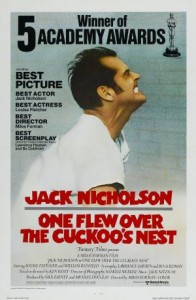 “They was giving me ten thousand watts a day, you know, and I’m hot to trot! The next woman takes me on’s gonna light up like a pinball machine and pay off in silver dollars!”— R. P. McMurphy after a shock treatment
“They was giving me ten thousand watts a day, you know, and I’m hot to trot! The next woman takes me on’s gonna light up like a pinball machine and pay off in silver dollars!”— R. P. McMurphy after a shock treatment
If there was ever an older movie which richly deserves its recent rebirth on Blu-ray it is One Flew Over the Cuckoo’s Nest. Even the history of its creation, the protracted attempts to film it, is a story in itself. Kirk Douglas immediately bought the movie and stage rights to Ken Kesey’s 1962 novel, though the 1963 Broadway play starring the actor was a failure. Douglas struggled unsuccessfully to find a producer to transfer the story to the movies until his son Michael championed it and, along with Saul Zaentz, was able to bring it to the screen in 1975.
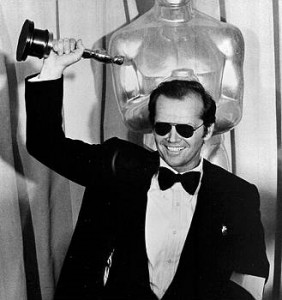 Unlikely material for the successful film it became—much foul language for its day and a depressing subject matter broken by moments of biting humor and exhilarating uplift—it won five Oscars: Picture, Actor (Jack Nicholson), Actress (Louise Fletcher), Director (Milos Forman) and Adapted Screenplay (Lawrence Hauben and Bo Goldman). It was the first time since It Happened One Night in 1934 that a picture had garnered these top five awards.
Unlikely material for the successful film it became—much foul language for its day and a depressing subject matter broken by moments of biting humor and exhilarating uplift—it won five Oscars: Picture, Actor (Jack Nicholson), Actress (Louise Fletcher), Director (Milos Forman) and Adapted Screenplay (Lawrence Hauben and Bo Goldman). It was the first time since It Happened One Night in 1934 that a picture had garnered these top five awards.
Even during and after production the problems continued. Kesey’s original screenplay was rejected and cinematographer Haskell Wexler, whose work was Oscar-nominated, had a falling out with Forman. Dr. Dean R. Brooks, a psychiatrist and director of the Oregon state hospital where the movie was filmed, plays the equivalent film role of Dr. Spivey. During filming, Brooks diagnosed William Redfield, who portrays patient Harding, with the leukemia that would kill him eighteen months later. Will Sampson who played the Chief, and was, in fact, a native American of the Creek Nation, died twelve years later.
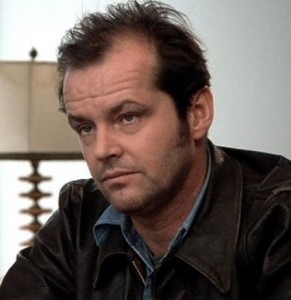 R. P. McMurphy (Nicholson), convicted of numerous assaults and statutory rape, has been transferred from prison to a hospital for psychiatric observation. At first he becomes irritated with his fellow patients, unfamiliar with their problems and unsympathetic toward their needs.
R. P. McMurphy (Nicholson), convicted of numerous assaults and statutory rape, has been transferred from prison to a hospital for psychiatric observation. At first he becomes irritated with his fellow patients, unfamiliar with their problems and unsympathetic toward their needs.
Before long, however, McMurphy becomes a champion of the ward, a defender of what he sees as the patients’ rights. He asks that the soothing, innocuous music from the 45 record player be turned down so that the men can hear themselves talk. Since a television is available, he suggests that everyone be allowed to watch the World Series. When that is denied, he stages an imaginary broadcast of a game which overstimulates the men and annoys their keepers.
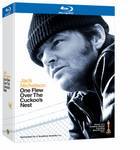 In all these attempts at reform McMurphy comes up against the stoic Nurse Ratched (Fletcher); she’s not so much a nurse as one of the great cinematic villains. Many critics have interpreted her harsh management of her charges as simply overzealous, a misguided adherence to the rules. Quite the contrary, I see her as deliberately malicious, with not only an inner hatred of herself, but, it would seem, of everyone. Inspired by McMurphy, the laughter of the men is a stark contrast to Ratched’s frozen, emotionless face, the coldness in her eyes, the deceptively hushed monotone of her voice. She doesn’t begin to share or appreciate the semblance of happiness brought to her patients.
In all these attempts at reform McMurphy comes up against the stoic Nurse Ratched (Fletcher); she’s not so much a nurse as one of the great cinematic villains. Many critics have interpreted her harsh management of her charges as simply overzealous, a misguided adherence to the rules. Quite the contrary, I see her as deliberately malicious, with not only an inner hatred of herself, but, it would seem, of everyone. Inspired by McMurphy, the laughter of the men is a stark contrast to Ratched’s frozen, emotionless face, the coldness in her eyes, the deceptively hushed monotone of her voice. She doesn’t begin to share or appreciate the semblance of happiness brought to her patients.
McMurphy, basically a loner and agitator, establishes a special bond with the Chief, and, as it turns out, the Chief with him. While waiting for their electric shock treatments (they have been in a fight), the Indian reveals a secret that prompts McMurphy to suggest it’s time they both escape the joint. His six-foot-seven-inch presence is commanding to say the least and, somehow, he emerges as one of the film’s most memorable characters—and, as well, the hero, if there can be one in this dark tapestry.
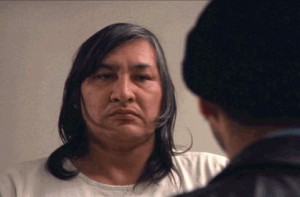 Along with Sampson, who naturally played a number of Native Americans in his short career, there are actors who would later become bigger names: Danny DeVito, Vincent Schiavelli (the first actor seen in Amadeus), Sydney Lassick, Christopher Lloyd (of Back to the Future fame), William Duell and Scatman Crothers. Making his film début, Brad Dourif (Grima in The Lord of the Rings series) is a pimple-faced, stuttering kid having his first sexual encounter with a woman, thanks to McMurphy. Dourif was nominated Best Supporting Actor, losing to George Burns in The Sunshine Boys.
Along with Sampson, who naturally played a number of Native Americans in his short career, there are actors who would later become bigger names: Danny DeVito, Vincent Schiavelli (the first actor seen in Amadeus), Sydney Lassick, Christopher Lloyd (of Back to the Future fame), William Duell and Scatman Crothers. Making his film début, Brad Dourif (Grima in The Lord of the Rings series) is a pimple-faced, stuttering kid having his first sexual encounter with a woman, thanks to McMurphy. Dourif was nominated Best Supporting Actor, losing to George Burns in The Sunshine Boys.
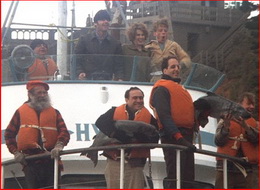 One of the positive, spirited highlights, set against all the gloom and horror, is the enterprising McMurphy hijacking, first, a bus then a charter boat. He takes his fellow inmates fishing and although they are apprehended, they do catch a fish—and have a lot of fun. The ending, though, is a downer—one of the darkest downers in filmdom—but counter to this is the Chief’s victory over the insanity of it all and the abuse of the mentally ill, which is one, only one, of the themes of the movie.
One of the positive, spirited highlights, set against all the gloom and horror, is the enterprising McMurphy hijacking, first, a bus then a charter boat. He takes his fellow inmates fishing and although they are apprehended, they do catch a fish—and have a lot of fun. The ending, though, is a downer—one of the darkest downers in filmdom—but counter to this is the Chief’s victory over the insanity of it all and the abuse of the mentally ill, which is one, only one, of the themes of the movie.
It’s perhaps regrettable that Nurse Ratched didn’t receive her “proper” comeuppance, as George did in The Magnificent Ambersons and Fred C. Dobbs in The Treasure of the Sierra Madre. She nearly did, though. A little short of justice, one might say.
And yes, OFOTCN has been released before, even on blu-ray before. In fact, we even talked to it before. But no matter. If you are a real fan of the film (which you should be), you most likely have a copy on DVD or even the blu-ray already. The question is, does the new version merit the additional expense of purchase?
If you have the standard DVD release, the answer is an overwhelming yes. If you have the pre-existing blu-ray release, the picture is a bit muddier. This release is the same transfer verbatim as the previous blu-ray release, but the difference comes in the supplemental material. Included in the new Ultimate Collector’s edition release is an 87 minute retrospective entitled “Completely Cuckoo.” This is on the existing blu-ray in a significantly abbreviated version. Although the hype touts an “All-new interview with Michael Douglas” as being included this is not to be found on the set, although a new interview with Douglas appears to be spliced over several other features. Odd to say the least. In addition here you get a deck of cast inspired playing cards, a reproduction of the original press book, the commemorative hard-bound book, and a few reproductions of international theatrical posters and character photo cards.
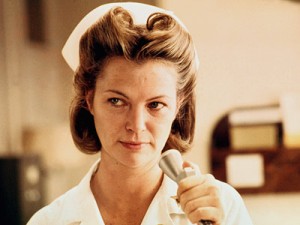 Given the dearth of new material and the lack of an upgrade in the transfer of this new release, the desirability of this over the preexisting blu-ray release is dependent on how much one needs those playing cards. Now if you are still saddled with a standard DVD release, this is a must buy. Otherwise tread carefully. The added footage in the retrospective is of marginal value so it really boils down to how much one really wants the additional swag. In any case, any collection worth it’s salt requires this film in it.
Given the dearth of new material and the lack of an upgrade in the transfer of this new release, the desirability of this over the preexisting blu-ray release is dependent on how much one needs those playing cards. Now if you are still saddled with a standard DVD release, this is a must buy. Otherwise tread carefully. The added footage in the retrospective is of marginal value so it really boils down to how much one really wants the additional swag. In any case, any collection worth it’s salt requires this film in it.
And yet again, kudos to Warners, as not only have they continued their dedication to the classic genre, they also continue to push the envelope online as well. For ONE FLEW OVER THE CUCKOO’S NEST is also now available ON DEMAND and FOR DOWNLOAD (exclusively with EXTRAS on iTunes: http://bit.ly/WBDD_Cuckoo
Check out the official site at www.warnerblu.com. It is becoming really hard not to crown WB as the best of all studios in support of their classic catalog.
Review copy provided by Warner Bros. Thanks!